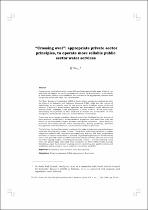 ResearchSpace
ResearchSpace
“Crossing over”: appropriate private sector principles, to operate more reliable public sector water services
JavaScript is disabled for your browser. Some features of this site may not work without it.
- ResearchSpace
- →
- Research Publications/Outputs
- →
- Journal Articles
- →
- View Item
| dc.contributor.author |
Wall, K

|
|
| dc.date.accessioned | 2008-09-25T10:04:42Z | |
| dc.date.available | 2008-09-25T10:04:42Z | |
| dc.date.issued | 2008-07 | |
| dc.identifier.citation | Wall, K. “Crossing over”: appropriate private sector principles, to operate more reliable public sector water services. The Journal of Transdisciplinary Research in Southern Africa, Vol. 4(1), pp 95-121 | en |
| dc.identifier.uri | http://hdl.handle.net/10204/2464 | |
| dc.description | Copyright: 2008 Transdisciplinary Research in Southern Africa | en |
| dc.description.abstract | Private sector institutions utilise many different business methods, some of which can selectively be adapted for use by organisations outside the private sector, to the benefit of their service delivery responsibilities. But the best of the appropriate practices from the private sector have often `not crossed over`. The Water Research Commission (WRC) of South Africa, working in collaboration with the Council for Scientific and Industrial Research (CSIR), finds that the concept of franchising, so successfully used by the private sector to deliver many goods and services, if applied to water services operation and maintenance, could alleviate and address many challenges in the management of water services. At the same time, franchising could provide an ideal stimulus to support the development of local enterprises, all within the municipal service delivery environment. Franchisee water service providers, dependent for their livelihood on the success of their business, would have a strong incentive to perform, and would also enjoy the benefit of the franchisor’s expert guidance and quality assurance. Some areas for potential franchising include meter management, billing, plumbing, pressure management, sewer maintenance, and wastewater treatment processes. The help from the franchisor would be of particular value to water services authorities at a distance from the major urban centres. Few of these authorities can afford to employ competent qualified staff, and often non-compliance with the laid down performance standards is a direct consequence of this lack. Significant improvements would soon be seen if the generally under-qualified and under-resourced water services staff could have this ongoing support, mentoring and quality control — or if the authority could enter into partnerships with small local enterprises or NGOs which would, through franchising, enjoy the necessary ongoing support, mentoring and quality control, and would have quick access to expert assistance when they needed it | en |
| dc.language.iso | en | en |
| dc.publisher | Transdisciplinary Research in Southern Africa | en |
| dc.subject | Franchising | en |
| dc.subject | Water services | en |
| dc.subject | Water management | en |
| dc.title | “Crossing over”: appropriate private sector principles, to operate more reliable public sector water services | en |
| dc.type | Article | en |
| dc.identifier.apacitation | Wall, K. (2008). “Crossing over”: appropriate private sector principles, to operate more reliable public sector water services. http://hdl.handle.net/10204/2464 | en_ZA |
| dc.identifier.chicagocitation | Wall, K "“Crossing over”: appropriate private sector principles, to operate more reliable public sector water services." (2008) http://hdl.handle.net/10204/2464 | en_ZA |
| dc.identifier.vancouvercitation | Wall K. “Crossing over”: appropriate private sector principles, to operate more reliable public sector water services. 2008; http://hdl.handle.net/10204/2464. | en_ZA |
| dc.identifier.ris | TY - Article AU - Wall, K AB - Private sector institutions utilise many different business methods, some of which can selectively be adapted for use by organisations outside the private sector, to the benefit of their service delivery responsibilities. But the best of the appropriate practices from the private sector have often `not crossed over`. The Water Research Commission (WRC) of South Africa, working in collaboration with the Council for Scientific and Industrial Research (CSIR), finds that the concept of franchising, so successfully used by the private sector to deliver many goods and services, if applied to water services operation and maintenance, could alleviate and address many challenges in the management of water services. At the same time, franchising could provide an ideal stimulus to support the development of local enterprises, all within the municipal service delivery environment. Franchisee water service providers, dependent for their livelihood on the success of their business, would have a strong incentive to perform, and would also enjoy the benefit of the franchisor’s expert guidance and quality assurance. Some areas for potential franchising include meter management, billing, plumbing, pressure management, sewer maintenance, and wastewater treatment processes. The help from the franchisor would be of particular value to water services authorities at a distance from the major urban centres. Few of these authorities can afford to employ competent qualified staff, and often non-compliance with the laid down performance standards is a direct consequence of this lack. Significant improvements would soon be seen if the generally under-qualified and under-resourced water services staff could have this ongoing support, mentoring and quality control — or if the authority could enter into partnerships with small local enterprises or NGOs which would, through franchising, enjoy the necessary ongoing support, mentoring and quality control, and would have quick access to expert assistance when they needed it DA - 2008-07 DB - ResearchSpace DP - CSIR KW - Franchising KW - Water services KW - Water management LK - https://researchspace.csir.co.za PY - 2008 T1 - “Crossing over”: appropriate private sector principles, to operate more reliable public sector water services TI - “Crossing over”: appropriate private sector principles, to operate more reliable public sector water services UR - http://hdl.handle.net/10204/2464 ER - | en_ZA |





